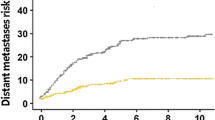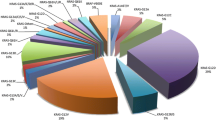Abstract
Background
PIK3CA mutations in the helical domain (in exon 9) and in the kinase domain (exon 20) cause tumor formation by different means. We aimed to determine the effects of each of these mutations on survival of colon carcinoma patients.
Methods
A large cohort of 685 colon carcinoma patients was tested for PIK3CA mutations in exons 9 and 20 by single nucleotide primer extension (N = 428) or by real time PCR (N = 257).
Results
PIK3CA mutation rate was 13%. 66 of 83 (79.5%) were in exon 9 and 17 of 83 (20.5%) in exon 20. In survival analysis, PIK3CA mutations in exon 9 and 20 had different effects on patient outcome. The PIK3CA exon 20 mutation conferred a poorer disease free survival compared to patients with wild type alleles and exon 9 mutations (Log rank p = 0.04 and p = 0.03 respectively) and cancer specific survival (Log rank p = 0.03 and p = 0.056 respectively) in stage III patients. In stage I and II this negative effect on outcome was not seen.
Conclusions
PIK3CA mutation in exon 20 is a negative prognostic factor in stage III colon cancer patients. Moreover, this negative effect is not present in stage I and II patients.


Similar content being viewed by others
References
C.G. Moertel, T.R. Fleming, J.S. Macdonald, D.G. Haller, J.A. Laurie, C.M. Tangen et al., Fluorouracil plus levamisole as effective adjuvant therapy after resection of stage III colon carcinoma: a final report. Ann. Intern. Med. 122(5), 321–326 (1995)
T. Andre, D. Sargent, J. Tabernero, M. O'Connell, M. Buyse, A. Sobrero et al., Current issues in adjuvant treatment of stage II colon cancer. Ann. Surg. Oncol. 13(6), 887–898 (2006)
C.B. Diep, L. Thorstensen, G.I. Meling, E. Skovlund, T.O. Rognum, R.A. Lothe, Genetic tumor markers with prognostic impact in Dukes’ stages B and C colorectal cancer patients. J. Clin. Oncol. 21(5), 820–829 (2003)
W.S. Jo, J.M. Carethers, Chemotherapeutic implications in microsatellite unstable colorectal cancer. Cancer Biomark. 2(1–2), 51–60 (2006)
D.J. Sargent, S. Marsoni, G. Monges, S.N. Thibodeau, R. Labianca, S.R. Hamilton et al., Defective mismatch repair as a predictive marker for lack of efficacy of fluorouracil-based adjuvant therapy in colon cancer. J. Clin. Oncol. 28(20), 3219–3226 (2010)
F.A. Sinicrope, R.L. Rego, N. Foster, D.J. Sargent, H.E. Windschitl, L.J. Burgart et al., Microsatellite instability accounts for tumor site-related differences in clinicopathologic variables and prognosis in human colon cancers. Am. J. Gastroenterol. 101(12), 2818–2825 (2006)
F.A. Sinicrope, R.L. Rego, K.C. Halling, N. Foster, D.J. Sargent, B. La Plant et al., Prognostic impact of microsatellite instability and DNA ploidy in human colon carcinoma patients. Gastroenterology 131(3), 729–737 (2006)
F.A. Sinicrope, D.J. Sargent, Clinical implications of microsatellite instability in sporadic colon cancers. Curr. Opin. Oncol. 21(4), 369–373 (2009)
A.D. Roth, S. Tejpar, M. Delorenzi, P. Yan, R. Fiocca, D. Klingbiel et al., Prognostic role of KRAS and BRAF in stage II and III resected colon cancer: results of the translational study on the PETACC-3, EORTC 40993, SAKK 60-00 trial. J. Clin. Oncol. 28(3), 466–474 (2010)
A. Farina-Sarasqueta, G. van Lijnschoten, E. Moerland, G.J. Creemers, V.E. Lemmens, H.J. Rutten et al., The BRAF V600E mutation is an independent prognostic factor for survival in stage II and stage III colon cancer patients. Ann. Oncol. 21(12), 2396–2402 (2010)
K. Chen, P. Iribarren, W. Gong, J.M. Wang, The essential role of phosphoinositide 3-kinases (PI3Ks) in regulating pro-inflammatory responses and the progression of cancer. Cell. Mol. Immunol. 2(4), 241–252 (2005)
J.A. Engelman, J. Luo, L.C. Cantley, The evolution of phosphatidylinositol 3-kinases as regulators of growth and metabolism. Nat. Rev. Genet. 7(8), 606–619 (2006)
L. Zhao, P.K. Vogt, Class I PI3K in oncogenic cellular transformation. Oncogene 27(41), 5486–5496 (2008)
Y. Samuels, Z. Wang, A. Bardelli, N. Silliman, J. Ptak, S. Szabo et al., High frequency of mutations of the PIK3CA gene in human cancers. Science 304(5670), 554 (2004)
A.G. Bader, S. Kang, P.K. Vogt, Cancer-specific mutations in PIK3CA are oncogenic in vivo. Proc. Natl. Acad. Sci. U. S. A. 103(5), 1475–1479 (2006)
X.N. Guo, A. Rajput, R. Rose, J. Hauser, A. Beko, K. Kuropatwinski et al., Mutant PIK3CA-bearing colon cancer cells display increased metastasis in an orthotopic model. Canc. Res. 67(12), 5851–5858 (2007)
L. Barault, N. Veyrie, V. Jooste, D. Lecorre, C. Chapusot, J.M. Ferraz et al., Mutations in the RAS-MAPK, PI(3)K (phosphatidylinositol-3-OH kinase) signaling network correlate with poor survival in a population-based series of colon cancers. Int. J. Canc. 122(10), 2255–2259 (2008)
S. Ogino, K. Nosho, G.J. Kirkner, K. Shima, N. Irahara, S. Kure et al., PIK3CA mutation is associated with poor prognosis among patients with curatively resected colon cancer. J. Clin. Oncol. 27(9), 1477–1484 (2009)
S. Velho, C. Moutinho, L. Cirnes, C. Albuquerque, R. Hamelin, F. Schmitt et al., BRAF, KRAS and PIK3CA mutations in colorectal serrated polyps and cancer: primary or secondary genetic events in colorectal carcinogenesis? BMC Canc. 8, 255 (2008)
T. Ikenoue, F. Kanai, Y. Hikiba, T. Obata, Y. Tanaka, J. Imamura et al., Functional analysis of PIK3CA gene mutations in human colorectal cancer. Canc. Res. 65(11), 4562–4567 (2005)
C.H. Huang, D. Mandelker, O. Schmidt-Kittler, Y. Samuels, V.E. Velculescu, K.W. Kinzler et al., The structure of a human p110alpha/p85alpha complex elucidates the effects of oncogenic PI3Kalpha mutations. Science 318(5857), 1744–1748 (2007)
B. Markman, F. Atzori, J. Perez-Garcia, J. Tabernero, J. Baselga, Status of PI3K inhibition and biomarker development in cancer therapeutics. Ann. Oncol. 21(4), 683–691 (2009)
M. Barbareschi, F. Buttitta, L. Felicioni, S. Cotrupi, F. Barassi, M. Del Grammastro et al., Different prognostic roles of mutations in the helical and kinase domains of the PIK3CA gene in breast carcinomas. Clin. Canc. Res. 13(20), 6064–6069 (2007)
M. Miyaki, T. Iijima, T. Yamaguchi, K. Takahashi, H. Matsumoto, M. Yasutome et al., Mutations of the PIK3CA gene in hereditary colorectal cancers. Int. J. Canc. 121(7), 1627–1630 (2007)
S. Kato, S. Iida, T. Higuchi, T. Ishikawa, Y. Takagi, M. Yasuno et al., PIK3CA mutation is predictive of poor survival in patients with colorectal cancer. Int. J. Canc. 121(8), 1771–1778 (2007)
H. Prenen, J. De Schutter, B. Jacobs, W. De Roock, B. Biesmans, B. Claes et al., PIK3CA mutations are not a major determinant of resistance to the epidermal growth factor receptor inhibitor cetuximab in metastatic colorectal cancer. Clin. Canc. Res. 15(9), 3184–3188 (2009)
C.D. Hurst, T.C. Zuiverloon, C. Hafner, E.C. Zwarthoff, M.A. Knowles, A SNaPshot assay for the rapid and simple detection of four common hotspot codon mutations in the PIK3CA gene. BMC Res. Notes 2, 66 (2009)
C. Chaussade, K. Cho, C. Mawson, G.W. Rewcastle, P.R. Shepherd, Functional differences between two classes of oncogenic mutation in the PIK3CA gene. Biochem. Biophys. Res. Commun. 381(4), 577–581 (2009)
Y.L. Lai, B.L. Mau, W.H. Cheng, H.M. Chen, H.H. Chiu, C.Y. Tzen, PIK3CA exon 20 mutation is independently associated with a poor prognosis in breast cancer patients. Ann. Surg. Oncol. 15(4), 1064–1069 (2008)
H. Pang, R. Flinn, A. Patsialou, J. Wyckoff, E.T. Roussos, H. Wu et al., Differential enhancement of breast cancer cell motility and metastasis by helical and kinase domain mutations of class IA phosphoinositide 3-kinase. Canc. Res. 69(23), 8868–8876 (2009)
L. Zhao, P.K. Vogt, Helical domain and kinase domain mutations in p110alpha of phosphatidylinositol 3-kinase induce gain of function by different mechanisms. Proc. Natl. Acad. Sci. U. S. A. 105(7), 2652–2657 (2008)
N. Miled, Y. Yan, W.C. Hon, O. Perisic, M. Zvelebil, Y. Inbar et al., Mechanism of two classes of cancer mutations in the phosphoinositide 3-kinase catalytic subunit. Science 317(5835), 239–242 (2007)
V. Lemmens, L. van Steenbergen, M. Janssen-Heijnen, H. Martijn, H. Rutten, J.W. Coebergh, Trends in colorectal cancer in the south of the Netherlands 1975–2007: rectal cancer survival levels with colon cancer survival. Acta Oncol. 49(6), 784–796 (2010)
L.N. van Steenbergen, M.A. Elferink, P. Krijnen, V.E. Lemmens, S. Siesling, H.J. Rutten et al., Improved survival of colon cancer due to improved treatment and detection: a nationwide population-based study in The Netherlands 1989–2006. Ann. Oncol. 21(11), 2206–2212 (2010)
W. De Roock, B. Claes, D. Bernasconi, J. De Schutter, B. Biesmans, G. Fountzilas et al., Effects of KRAS, BRAF, NRAS, and PIK3CA mutations on the efficacy of cetuximab plus chemotherapy in chemotherapy-refractory metastatic colorectal cancer: a retrospective consortium analysis. Lancet Oncol. 11(8), 753–762 (2010)
S.M. Johnson, P. Gulhati, B.A. Rampy, Y. Han, P.G. Rychahou, H.Q. Doan et al., Novel expression patterns of PI3K/Akt/mTOR signaling pathway components in colorectal cancer. J. Am. Coll. Surg. 210(5), 776–778 (2010)
H.C. Kwon, S.H. Kim, M.S. Roh, J.S. Kim, H.S. Lee, H.J. Choi et al., Gene expression profiling in lymph node-positive and lymph node-negative colorectal cancer. Dis. Colon. Rectum 47(2), 141–152 (2004)
N.T. Ihle, G. Powis, Inhibitors of phosphatidylinositol-3-kinase in cancer therapy. Mol. Aspects Med. 31(2), 135–144 (2010)
Author information
Authors and Affiliations
Corresponding author
Electronic supplementary material
Below is the link to the electronic supplementary material.
Figure
(DOC 77 kb)
Rights and permissions
About this article
Cite this article
Fariña Sarasqueta, A., Zeestraten, E.C.M., van Wezel, T. et al. PIK3CA kinase domain mutation identifies a subgroup of stage III colon cancer patients with poor prognosis. Cell Oncol. 34, 523–531 (2011). https://doi.org/10.1007/s13402-011-0054-4
Accepted:
Published:
Issue Date:
DOI: https://doi.org/10.1007/s13402-011-0054-4




